【重要単語・表現】
airstrike (air strike): 空爆
be under siege: 包囲されて
conflict: 戦闘、衝突
the United Nations: 国際連合
humanitarian effort: 人道的努力
psychic numbing: 精神的麻痺
the National Coalition of Syrian Revolution and Opposition Forces: シリア国民連合
saturation: 飽和(状態)
desensitization: 脱感作、鈍感にする
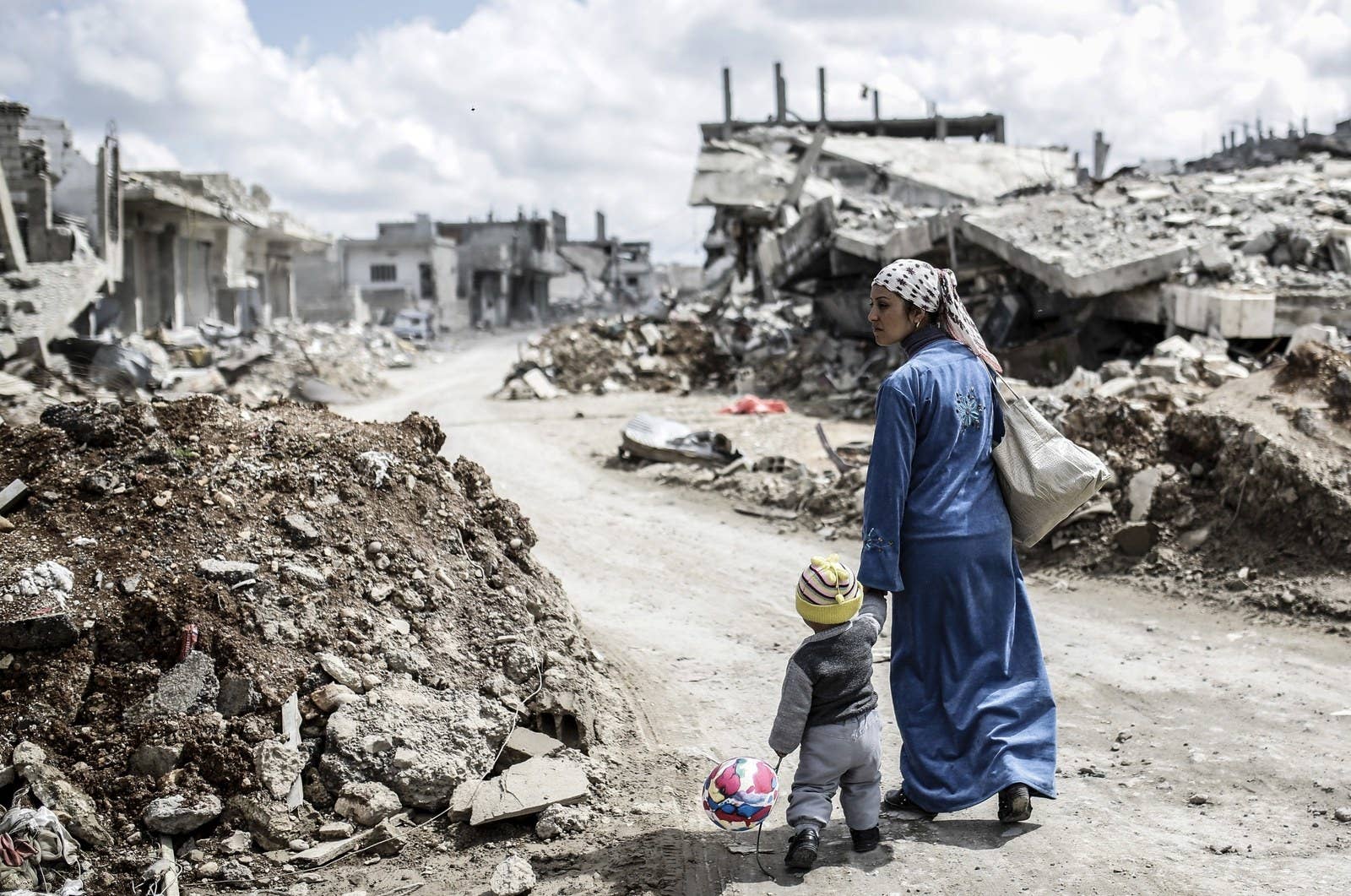
From an almost pitch black underground shelter mostly safe from the bombs, as kids scuffled in the background, 22-year-old Nour Adam filmed himself. “Children eat here, sleep here, and have their life here,” he said. “They don’t have any place to get out. The airstrikes are still in the sky, hitting the buildings and the towns.”
Later, as he has to do every time he wants his videos to be seen by the wider world, he braved more shells to scramble to the roof of the building to get signal and post the video to Twitter, in a process he has repeated hundreds, possibly thousands of times. He hashtagged his tweet “#IAmStillAlive.” Adam lives in Douma, Eastern Ghouta, which has been under siege for five years. As the seven-year anniversary of the Syrian civil war approaches, he is asking himself: Is anyone out there still watching?
Global interest in the conflict is waning, and analysis by BuzzFeed News shows the number of shares on Facebook, Twitter, and other social media sites of the most-read stories about Syria in the past two months were a 10th of what they were just over a year ago.
“When I take a photograph or a video and post it on my Twitter I really hope that someone will really help us, and really see what is happening here in Ghouta,” Adam, a journalist and activist said, speaking to BuzzFeed News from a roof in the city of Douma. “I work so hard to try and post videos, but no one cares. I don’t know what to say. They just see the article or report, and just say: ‘Oh, that’s really sad.’ And after that they turn the internet off and go and live their lives.”
“It’s like death,” he added. “You work and work and work to help people here and to help us but no one feels anything, and no one will act for our suffering.”
ほとんど暗闇といっていい地下の防空壕に身を寄せ、爆撃から身を守る。後ろで子どもたちが行き交う気配がする中、22歳のヌール・アダムは動画を撮りながら、みずから画面に向かって話す。「子どもたちはここで食事をし、眠り、ここで生活しています。他に行く場所はありません。外では空爆が続き、建物と町が破壊されています」
その後、毎日、より広く世界の人々の目にとまってほしいという思いから、砲弾の飛び交う地上へ出て建物の屋根に上り、インターネットにつないでTwitterに動画を投稿する。これまで数百回かそれ以上、繰り返してきた。投稿には「#IAmStillAlive」(私はまだ生きている)のハッシュタグをつける。アダムはダマスカス近郊東グータ地区の町、ドゥマで暮らしている。町はこの5年間包囲された状態が続く。シリアで内戦が始まって7年になる今、アダムは思う。世界には今も見てくれている人がいるのだろうか?
シリア情勢に対する国際社会の関心は薄れてきている。BuzzFeed Newsの調べでも、FacebookやTwitterをはじめとする各種ソーシャルメディアで過去2か月にもっとも読まれたシリア関連記事がシェアされた回数は、1年前とくらべると10分の1にまで減っている。
「写真や動画を撮って投稿するのは、これを見た誰かに助けてほしい、ここで実際に起きていることを見てほしい、という強い思いがあるからです」。ジャーナリストや活動家として動くアダムは、ドゥマで屋根の上から取材に応えた。「動画をあげて必死で訴えても、誰も気にとめません。何と言えばいいのかわかりません。みんな、ただ記事を見て、ああ、ひどい話だね、と言ったら、あとはページを閉じてそれぞれ自分の生活に戻っていくだけです」
「死んでるみたいなものです。周りにいる人を助けるため、自分たちを助けるために、何とかしようととにかく必死になってもがいてもがき続けても、誰も何も感じない、厳しい状況にある僕たちのために誰も動いてくれない」
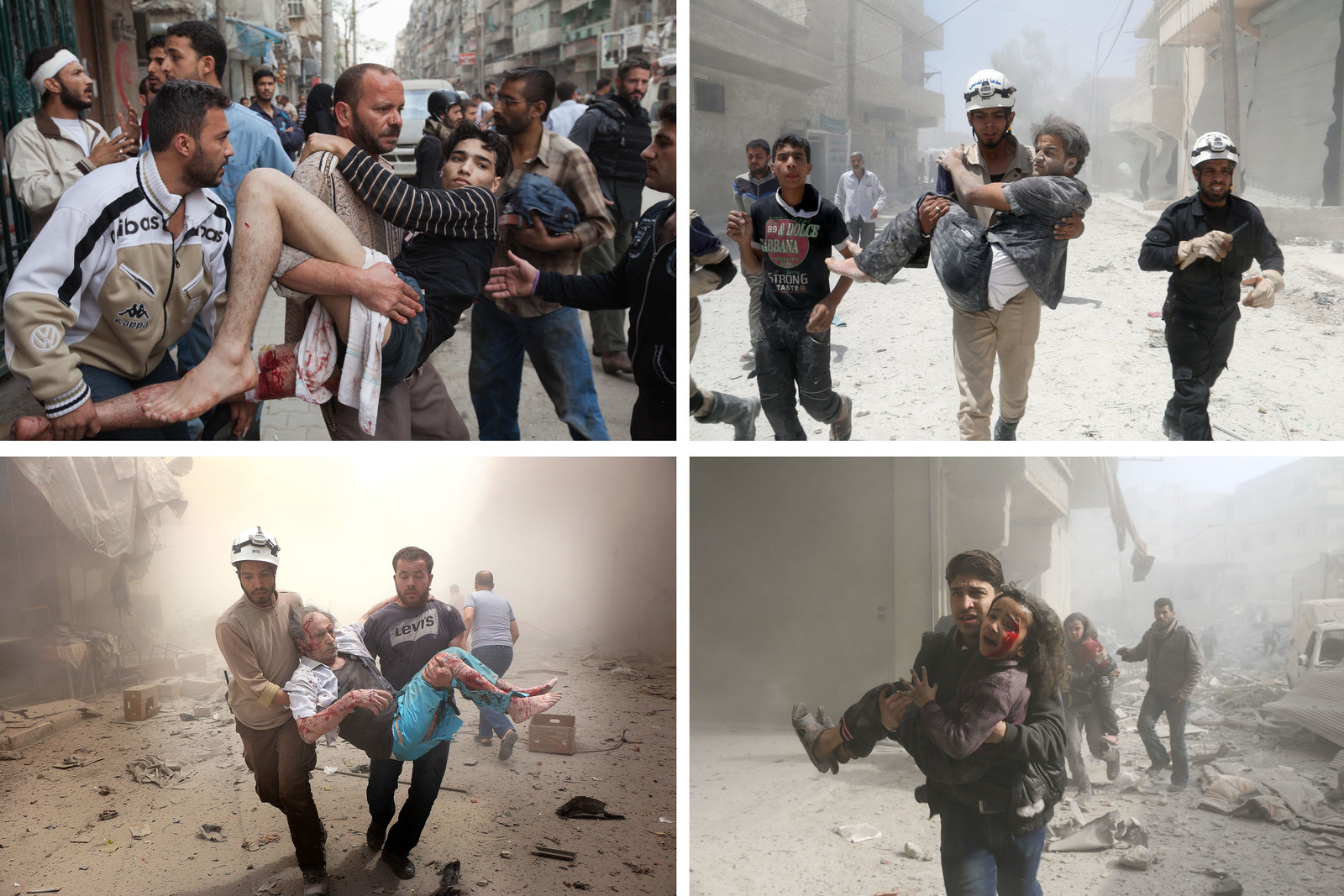
Adam is just one of many Syrians who spend their spare waking moments speaking to Western journalists, trying to explain what it is like being on the ground as the bombs fall.
Once the footage is online people like Ethar El-Katatney, executive producer of AJ+, pick it up, and try to work out how they can tell the next story from Syria.
“All of the footage I am looking at today looks the same as the footage I saw a year ago and it’s the same dust, and blood, and screaming, and hospital rooms and hospital floors,” El-Katatney told BuzzFeed News. “It has become normalized.”
El-Katatney, speaking by phone from New York, has covered the conflict from her newsroom since the revolution began in 2011. She recently tweeted her frustration at seeing such similar images again and again, and the difficulty in getting people to care about the situation.
I just saw 3 seconds of a Syrian boy, covered in blood & dust, crying out for his dead father. Immediate tears. It isn't normal to be witnessing this every day. It just isn't. 100 dead today. And as a manger of a newsroom, I still don't know how can I possibly make people care.
El-Katatney was surprised by the number of nonjournalists who reacted to her tweet: “People are feeling helpless, they are feeling [that] it is not that we don’t care — it’s that we just can’t do anything.”
The failure of the United Nations and other international efforts to stop the war, or even present a credible timeline for an end to the fighting, can feel like a huge shadow over any humanitarian efforts to mitigate the effects of the conflict. And after seven years, the conflict is getting only more entrenched and complicated.
“We have hit a ceiling in shocking people,” El-Katatney said. “From [a] pool of blood, or a dying child, and now people have come across severed limbs, decapitation. I don’t think there is anything that I can show that will shock anyone, no matter what it is.
“There is nothing that won’t surprise anyone, or shock anyone into anything.”
This may be true.
シリアには今、アダムのようにこうして機会を作っては、砲撃が続く現地の様子を西側のメディアを通じて伝えようとする市民が大勢いる。
映像が投稿されると、例えばアルジャジーラ系列メディア「AJ+」のエグゼクティブ・プロデューサー、イサール・カタト二のような人物が目をとめ、次はどうやってシリアの現状を伝えようかと思案する。
「今日私が見ているシリアからの映像は全部、1年前の映像と同じに見えます。どれも砂埃、流血、叫び声、病院の部屋と床ばかりです。もはやこれが常態化しています」
今回ニューヨークから電話取材に応じたカタトニは、2011年に民主化運動が始まって以来、ジャーナリストとしてシリア情勢を追ってきた。今年2月、似たような悲惨な画像をひたすら繰り返し目にする状況へのいらだちやもどかしさと、人々にこうした現状に思いを寄せてもらうことの難しさをTwitterでつぶやいた。
「シリアの男の子の映像を3秒見た。土と血にまみれ、死んだ父親を求めて泣いている。瞬時に涙がにじむ。こんな場面を毎日目にするのは普通じゃない。普通なわけがない。今日1日で死者は100人。ニュースの現場でマネジャーを務めながら、どうしたら人々に思いを寄せてもらえるのかわからずにいる」
すると、一般の人から次のような多くの反響があり、カタトニはその数に驚いた。「みんな無力感を覚えています。気にかけてないわけではありません。何もできることがないと感じているんです」
国連やその他の国際的な枠組が呼びかけても争いを止められず、戦闘の終結に向けて現実味のある道筋を示すことすらできない現状は、内戦による被害を緩和しようとするあらゆる人道的な取り組みに立ちはだかる大きな暗影のようだ。そして7年が過ぎた今、内戦状態はますます行き詰まり、複雑になっている。
カタトニはこう続ける。「メディアの側が受け手の心を揺さぶるのも、もう頭打ちになりました。人々は報道を通じて、血の海や死んでゆく子ども、切断された手足や斬首の場面まで目にしてきました。もうこれ以上何を伝えても誰もショックを受けない気がします」
「もう何を見ても誰も驚かないし、ショックを受けないんです」
もしかしたら、彼の言う通りなのかもしれない。
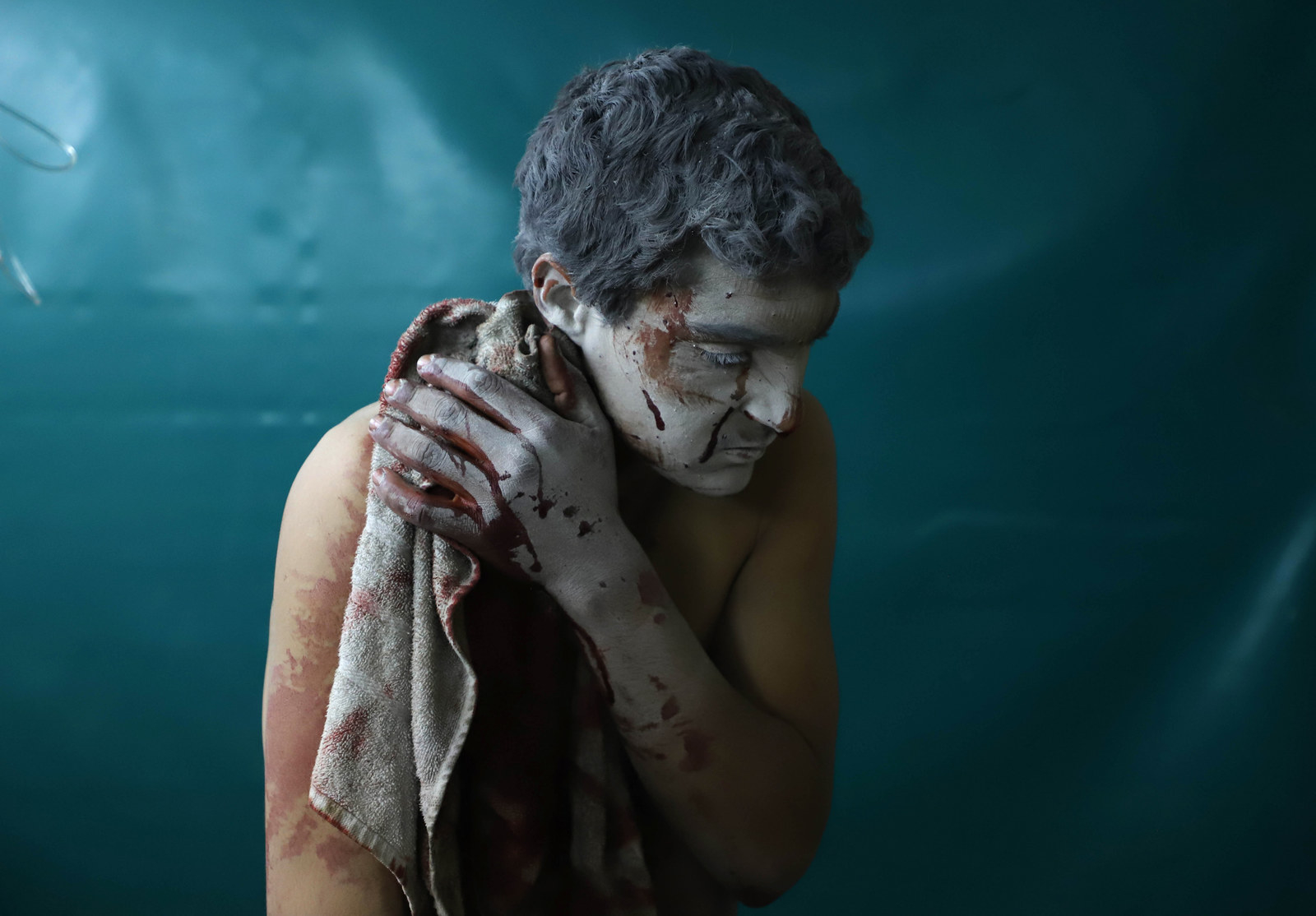
BuzzFeed News analysis, using the social media monitoring tool BuzzSumo, found that the number of shares on the most-read stories about Syria — across all publishers — has fallen dramatically in little over a year.
Comparisons are difficult, partly due to fluctuations in the intensity of the conflict, and also owing to Facebook’s recent algorithm change at the end of 2017. Nevertheless, the figures are stark.
In the final two months of 2016, as the four-year siege of the rebel-held city of Aleppo ended in brutal fashion, the four more-shared stories were all shared more than 300,000 times. The best performing story (about how people could help civilians trapped in Aleppo) was shared more than half a million times, almost entirely on Facebook.
However, in January and February this year, as the Syrian regime and Russian forces bombarded the enclave of Eastern Ghouta, the most viral piece across all publishers (a BBC News article about children struggling to survive) was shared just 42,000 times.
Just deeply disheartening to see readership numbers drop whenever we do a Syria story in the newsletter. Like clockwork.
Paul Slovic, who leads research on the public’s failure to respond to mass tragedies, said that people seem to show less interest in Syria because human brains are incapable of coping with prolonged catastrophes, a phenomenon called “psychic numbing.”
@SulomeAnderson I do find myself scrolling past photos of dead children in Ghouta, because the pics make me feel so helpless. It's horrible and horrific, but I don't know what I can do about it.
“The ancient structures in our brain evolved to respond very quickly to information that was right in front of us, that we needed to react to to survive,” he told BuzzFeed News by phone from the University of Oregon. “That system of fast thinking through feelings doesn’t scale up — it doesn’t do arithmetic right.”
“In other words, if you see one person in danger or having been killed, you feel very badly. If you see a second person you don’t feel twice as bad,” he said. It gets worse, according to Slovic, because the more death and destruction you see, on social media for example, the more your feelings of empathy actually decreases. “One plus one is less than two,” in this situation, he said.
“We do numb to repeated photographs, just like we numb to increasing numbers of individuals,” he said.
ソーシャルメディアにおけるコンテンツの拡散状況をみるツール、BuzzSumoでBuzzFeed Newsが全パブリッシャーを対象に分析したところ、シリア関連でもっともよく読まれた記事がシェアされた回数はこの1年余りで激減している。
情勢の動向によって変動がある点、また昨年末にFacebookのアルゴリズムに変更があった点を考慮すれば、単純な比較は難しい。それでも非常に厳しい数字だ。
2016年11月から12月にかけて、反政府勢力が4年にわたり拠点としていたアレッポが政府軍との激しい衝突の末に陥落したが、この間、シェア数の多かった4本の関連記事はいずれも30万回以上シェアされた。もっとも読まれたのは、壊滅的な状態にあるアレッポに足止めされた市民を助けるために私たちにできることを呼びかけた記事で、50万回以上シェアされ、そのほとんどがFacebook上にて拡散された。
だが今年1月から2月、シリア政府軍がロシアの援護を受けて東グータ地区を空爆した時期には、全メディアを通じてもっとも拡散された記事(東グータ地区で戦闘を生き延びようとする子どもたちの姿を伝えるBBCの記事)でも4万2000回のシェアにとどまっている。
大規模な惨事に対して大衆が反応を示さなくなる現象について研究してきた心理学者のポール・スロヴィックによれば、人々がシリア情勢について関心を示さなくなってきているように見えるのは、危機的な惨劇が長期化すると人間の脳がそれを受けとめきれなくなる「心理的麻痺」の状態におちいるためだ、という。
スロヴィック氏はオレゴン大学で電話取材に応え、次のように説明した。「私たちの脳の構造で『古い脳』と呼ばれる部分は、すぐ目の前にある情報、生きていくために反応しなくてはいけない情報にすばやく反応するように進化しました。感情に根ざした『速い思考』のシステムは、一定の基準どおりに判断を下すわけではありません。計算どおりにはいかないのです」
「つまり、一人の人が危険にさらされたり殺されたりすると、人は強く心を痛めます。でも次にもう一人が同じ目にあったと知っても、心の痛みは2倍にはなりません」。そして、SNSなどを通じて多くの死や破壊行為を目の当たりにすればするほど、感情移入の度合いは下がっていくという。こうした状況下では「1足す1は2より少ない」のだとスロヴィックは言う。
「同じような写真を何度も目にするうち、無感覚になっていきます。犠牲になった人の数が増えていくと無感覚になっていくのと同じように」
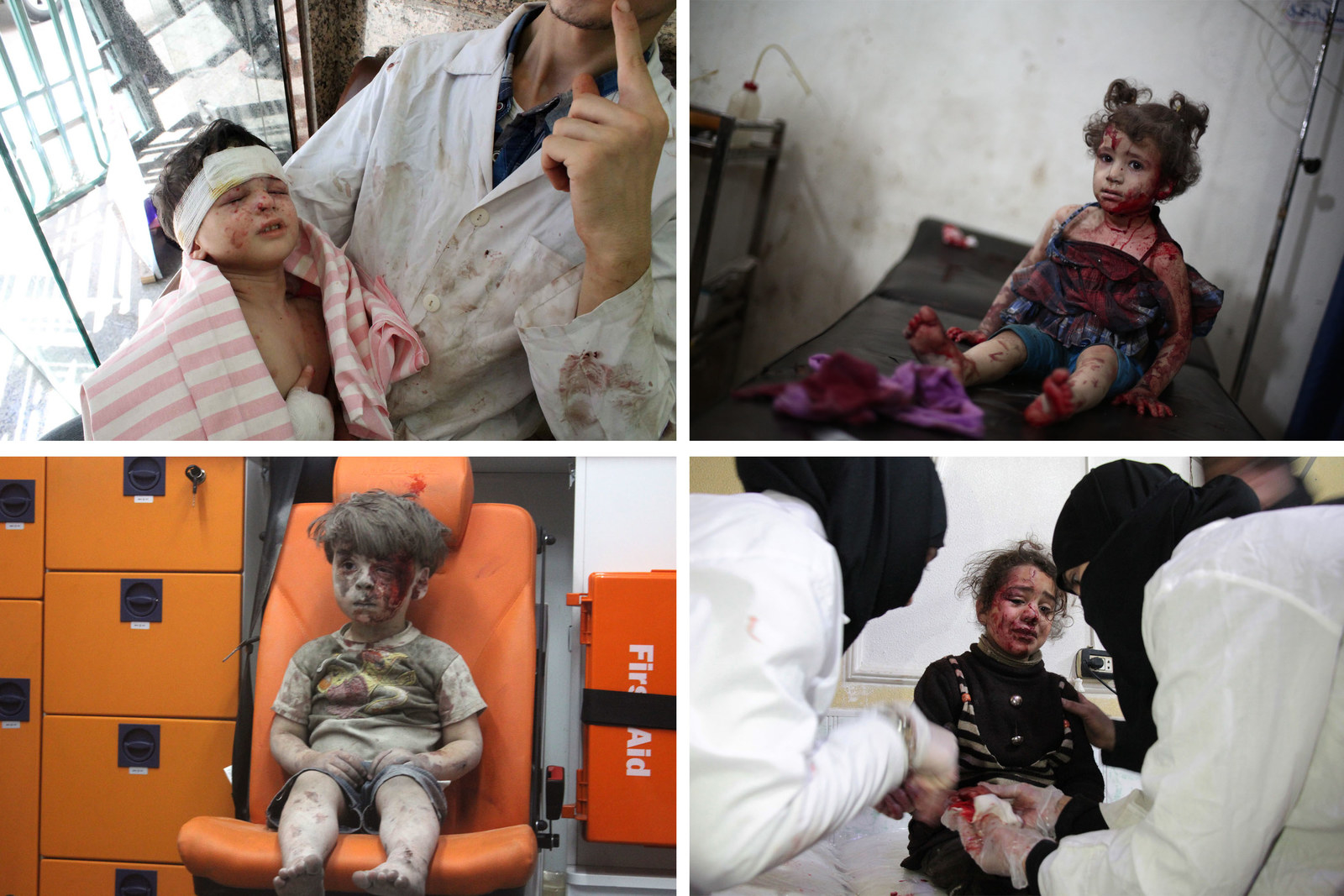
The rate of information, images, and outrage makes it harder to focus on that one important thing.
Echoing some of the findings of Slovic’s research, Syrians say that they’ve struggled to sustain the attention of the international community since the beginning of the conflict on March 15, 2011, when pro-democracy protests were subject to a brutal government crackdown. Since then almost half a million people have been killed, 5 million more have fled the country, and 6 million have been displaced internally.
One of the central stories of the war has been the international community’s failure to end it, or even protect civilians.
The specific UN mission to monitor the conflict was suspended a year into the war because of “escalating violence.” Carla Del Ponte, a veteran of prosecuting war criminals in Rwanda, resigned from the UN Commission to Investigate Syria last year. She said there was culture of total impunity in Syria, and she did not have the backing of the international political community. “That is not acceptable,” she said. Russian UN representatives have repeatedly vetoed resolutions, while Syria’s commissioner, Bashar Jaafari infamously laughed when asked about hospital bombings in Aleppo.
Decisions made by US President Donald Trump’s administration have contributed to keeping the conflict from the international community’s attention. Despite bombing Syria, Trump’s only focus in the country has been ISIS, leaving a vacuum that has been occupied fully by Vladimir Putin’s Russian forces, who have worked together with the regime of Bashar al-Assad to bombard the remaining rebels, like those in besieged Eastern Ghouta.
情報や画像、非道な行為の程度によって、目の前にある一つの大事なできごとを見つめることが難しくなってしまう。
スロヴィックの指摘を反映するように、シリアの人々は国際社会の関心を引き続けることの難しさを訴えてきた。2011年3月15日、民主化を求める抗議行動が政府による激しい弾圧を受けて内戦に発展して以来、戦闘が続く。これまでにおよそ50万人が命を落とし、500万人を超える人々が国外へ逃れ、600万人が国内で住む場所を追われている。
シリア情勢で問題として取り上げられる点の一つが、国際社会が戦争を終結に持ち込めず、市民の保護さえできていない現実にある。
2012年、停戦監視を目的に発足した国連シリア停戦監視団は「暴力の激化」を理由に活動を停止した。かつて国際刑事裁判所でルワンダの戦犯を裁く法廷を担当し、シリア問題に関する国連調査委員会を昨年辞任したカルラ・デルポンテ氏は、シリアでは犯罪行為に対する処罰が機能していないと指摘し、在任中、国際社会からの政治的支援も得られなかったと話す。「これは受け入れがたいことです」。これまで、解決に向けた国連安全保障理事会の決議案についてロシアは繰り返し拒否権を行使し、一方でシリアのバシャール・ジャファリ国連大使はアサド政権軍がアレッポの病院を爆撃したのかと記者から問われ無言で笑ったと報道されている。
米トランプ政権の動向も、シリア情勢に対する国際社会の関心を遠ざける動きに加担している。シリアで空爆を行っているにもかかわらず、トランプ大統領がシリアといえばISISにばかり注目してきた結果、空白ができ、プーチン大統領率いるロシア軍勢力がそこにつけこんだ。プーチン大統領はアサド政権を支援し、東グータ地区をはじめ反政府勢力が残る地区を攻撃してきた。
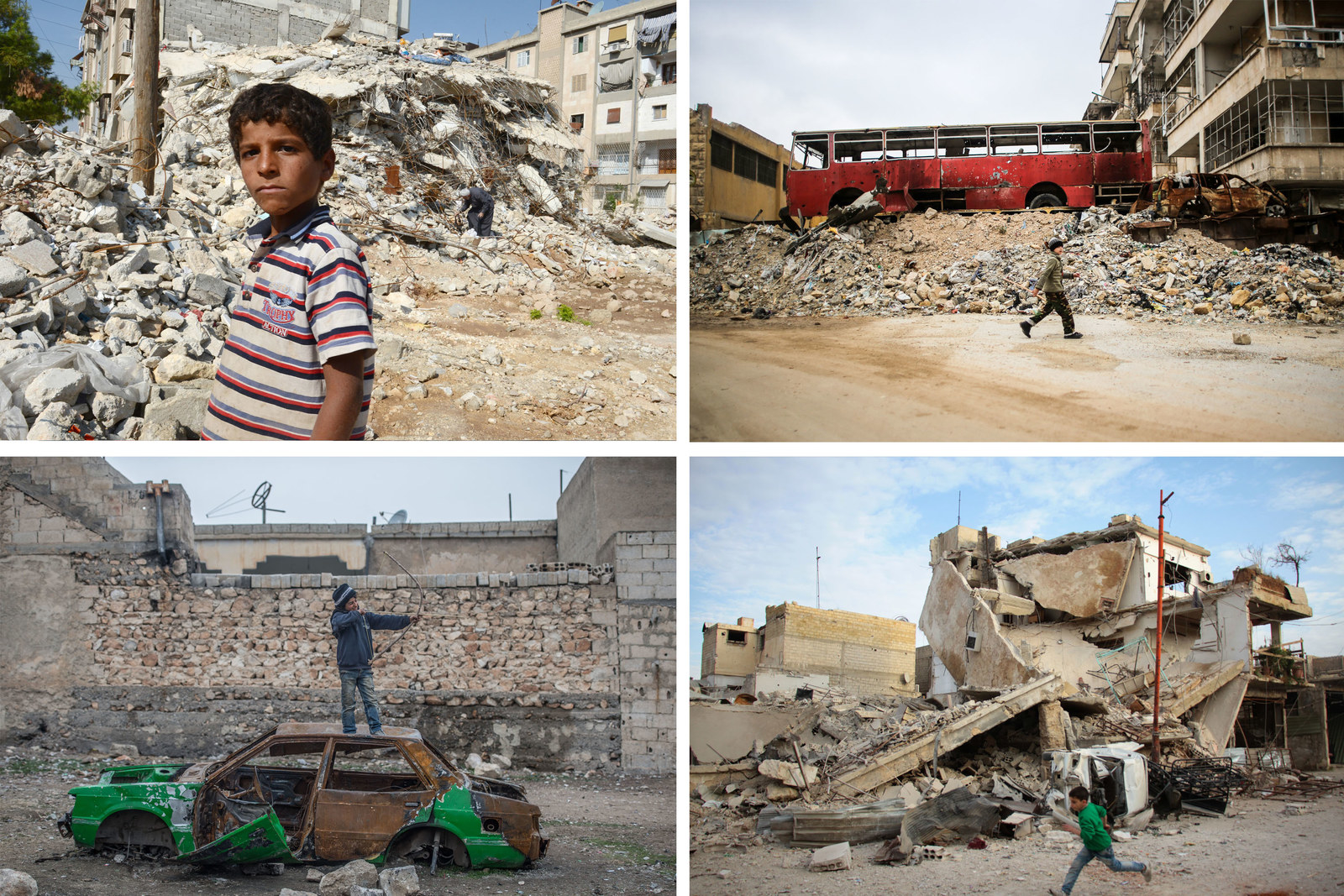
"I think the world is frustrated by the actions of the major powers," said Salwa Aksoy, vice president of the National Coalition of Syrian Revolution and Opposition Forces. "The struggle has lasted so long, and the scale of the war crimes has reached a level where there is just too much pain for the international community to look at it,” she told BuzzFeed News in an interview on the sidelines of a press conference in Istanbul in February.
In an attempt to cut through the violence of the repeated images and provoke action, UNICEF released a “blank” statement at the end of February.
“No words will do justice to the children killed, their mothers, their fathers and their loved ones " " " " " ." @UNICEF is issuing this blank statement. #ChildrenUnderAttack #RunningOutOfWords #Syria
Juliette Touma, UNICEF’s regional chief of communications for the Middle East and North Africa, said her organization had “issued hundreds of statements, news notes.”
Speaking to BuzzFeed News over the phone from Amman, Jordan, Touma struggled to articulate what the UN — and perhaps aid agencies more generally — could do next. “All of our calls to protect children inside Syria have gone unheeded,” she said.
“People are genuinely upset, if not angry or outraged, about what is happening now in Syria. For that I have no doubt about,’ she said. “There is, however, a certain element of fatigue among people about the suffering and the continuous horror stories. I think a lot of people feel helpless over what is happening and not being able to stop the bloodshed in Syria.”
Meanwhile, for many casual readers and viewers Syria is the same picture, same story, same situation as it was seven years ago.
“Watching it every day it just never stops, it never changes,” El-Katatney said. “It is just saturation. It’s desensitization, it’s numbness, it’s paralysis.
“I feel like if I have been doing this for years and years, and I have had millions watch and witness, but everything still remains the same.”
She is left asking: “What kind of ways can we cover Syria that we haven’t done a thousand times before, whether it is with footage or with the scripting? And sometimes we fail. Sometimes there just really is nothing.”
For Adam, messaging from a rooftop elsewhere in Ghouta, he could see the people not retweeting his stories, but he could also hear the shelling continue. “Today, like always bombing, airstrikes, and people killed. Like every day,” he said.
“But no one cares.”
Borzou Daraghi also contributed to this report.
「主要国の行動について、世界はもどかしさを感じていると思います。紛争状態があまりにも長期化して、戦争犯罪の行為も世界の人々が目を背けたくなるほど残酷なレベルに達しています」。反体制派の統一組織、シリア国民連合のサルワ・アクソイ副代表は2月、イスタンブールでの記者会見の際にBuzzFeed Newsの取材に応え、こう話した。
残忍な行為が繰り返される状態を打開し、行動を引き出したいという思いから、(国連児童基金(ユニセフ)は2月、シリア情勢について「白紙の声明」を出した。
「どんな言葉も、殺された子どもたちや、その母親、父親、彼らが愛した人たちの苦しみを正確に言い表すことはできない。
"
"
"
"
" 。"
ユニセフはこの白紙の声明を発表する」
ユニセフ中東・北アフリカ地域事務所のジュリエット・トウマ広報官はヨルダンのアンマンで電話取材に応え、ユニセフはこれまで「何百という声明やニュース記事を発表してきました」と語る。
国連、あるいは支援機関全体にとって次に打つ手は何があるのか、トウマは言葉を探した。「シリアにいる子どもたちを守らなくてはと繰り返し呼びかけてきましたが、その声は顧みられていません」
「怒りや憤りとまではいかないとしても、みんなシリアの現状について悲しんだり心を痛めたりしています。それは私も確信しています。でも、この終わりのない苦しみやおぞましいできごとの連続に、人々の間にある種の疲労が生まれています。多くの人が現状に無力感を覚え、シリアで続く殺戮を止められない現実になすすべがないと感じているのだと思います」
一方、メディアを通じてニュースに接する多くの一般の人にとって、シリアの報道は写真も内容も7年前と同じで、変わっていない。
「毎日見ていても全然終わりがないし変化もありません」と、ジャーナリストのカタト二は言う。「飽和状態なんです。鈍化して、麻痺して、無感覚になっている」
「私自身、もう何年も何年もずっとやってきた気がするし、たくさんの人に現状を見てもらってきたけれど、それでも状況は変わらないままです」
そしてこう自問する。「これまで無数にやってきたのとは別の方法でシリアを伝えるには、どんなやり方があるだろう? 映像でも文章でもいい。そしてうまくいかないときもあれば、何もできることがないときもある」
冒頭のアダムが東グータ地区のどこかの屋根の上からメッセージを発信する。あまり拡散はされないが、それでも空爆の音は今日も聞こえている。「今日もまた砲弾が落とされ、空爆され、人が死んでいく。毎日がこうです」
「でも誰も気にとめません」
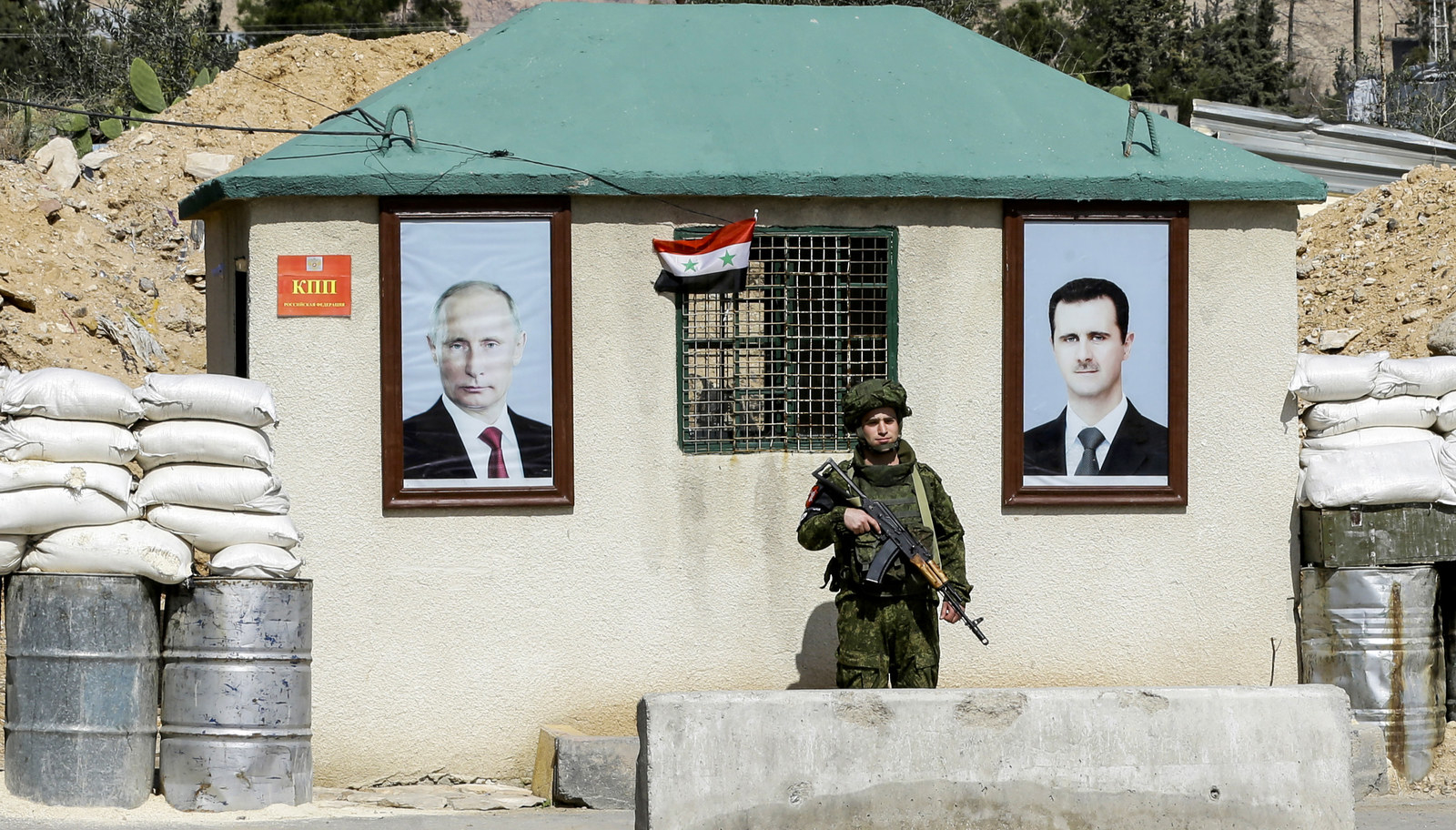
この記事は英語から翻訳・編集しました。翻訳:石垣賀子 / 編集:BuzzFeed Japan

